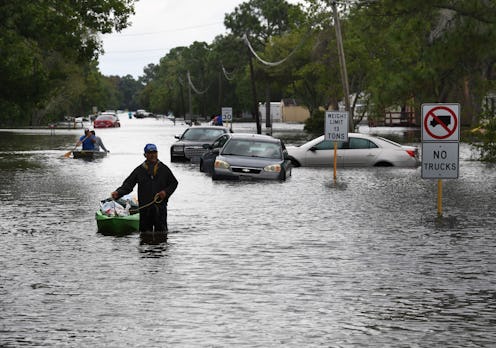News
A Chemical Plant Near Houston Is Going To Explode & Officials Say Nothing Can Stop It

According to the CEO of a chemical plant in Crosby, Texas, the area is in danger of the plant exploding, and there's no way it can be stopped. Days of rain from Hurricane Harvey has immersed the plant under roughly six feet of floodwater, causing the plant to lose its sources of power, meaning material that is meant to be refrigerated could prompt a powerful, unpreventable fire.
On Wednesday, Richard Rowe, CEO of the North American unit of Arkema Inc., released a statement saying:
At Crosby, we prepared for what we recognized could be a worst case scenario. We had redundant contingency plans in place. Right now, we have an unprecedented 6 feet of water at the plant. We have lost primary power and two sources of emergency backup power. As a result, we have lost critical refrigeration of the materials on site that could now explode and cause a subsequent intense fire.
He added that the plant's employees had been evacuated and that public officials are busy monitoring the situation.
We have evacuated our personnel for their own safety. The federal, state and local authorities were contacted a few days ago, and we are working very closely with them to manage this matter. They have ordered the surrounding community to be evacuated, too.
In addition to the company's staff being evacuated on Tuesday, 300 Crosby residents living within a 1.5-mile distance of the plant were voluntarily evacuated, a ratio Rowe described as "conservative" to the Texas Tribune.
The facility in Crosby produces organic peroxides, which the plant says are chemicals used to create a huge variety of products, from "pharmaceuticals to construction materials." Such chemicals require refrigeration and careful storing, something that became impossible once the facility's power went out. The six feet of water currently keeping the plant submerged make entry impossible, effectively making preventing an explosion impossible.
Other industrial facilities hit by Hurricane Harvey have been shut down — an estimated 15 percent of U.S. refining capacity has come to a stop — and damage at some facilities has heavily polluted the surrounding areas. According to Environmental Protection Agency spokesman David Gray, Exxon Mobil's refinery in Baytown reported the release of 15 pounds of the toxic carcinogen benzene, while gas company Shell informed state regulators that 100 pounds of benzene as well as 100 pounds of toluene had been released after the floating roof of one of its tanks at the company's oil refinery in Deer Park partially sank.
Despite the ominous sound of an explosion breaking out at a power plant, the Crosby facility's CEO added that he doubted any impact from the potential explosion would be felt beyond the plant's grounds.